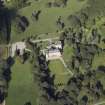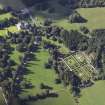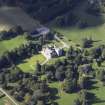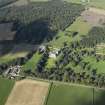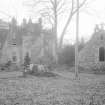Pricing Change
New pricing for orders of material from this site will come into place shortly. Charges for supply of digital images, digitisation on demand, prints and licensing will be altered.
Drum Castle, Chapel
Chapel (15th Century)
Site Name Drum Castle, Chapel
Classification Chapel (15th Century)
Alternative Name(s) Drum Castle Estate
Canmore ID 18545
Site Number NJ70SE 4.01
NGR NJ 79573 00465
Datum OSGB36 - NGR
Permalink http://canmore.org.uk/site/18545
- Council Aberdeenshire
- Parish Drumoak
- Former Region Grampian
- Former District Kincardine And Deeside
- Former County Aberdeenshire
NJ70SE 4.01 79573 00465
NJ 796 004 A drainage trench was excavated in the vicinity of the chapel. A watching brief was undertaken to establish whether any information on earlier formal garden layouts could be recovered.
Deposits of silty sand and a layer of medium-sized stones over the granite bedrock seem to represent levelling fill put in place for the landscaped area around the castle. Their deposition probably post-dates the early 19th century, based on ceramic finds.
Sponsor: National Trust for Scotland
S A Wallace 1998
Watching Brief (16 January 1996 - 18 January 1996)
Excavations for a drainage pipe beside the path leading to the chapel discovered a levelled surface that appeared to be of deliberate action. Its correspondence with the basement of the Jacobean mansion suggests that it reflects the clearance and levelling of the whole area down to bedrock, so that the construction of the house be based firmly upon granite. A shallow cut (F014) appears to be a drainage channel to take the water coming downslope away from the foundations of the building. Analysis of the finds, especially the bottle glass, pottery and clay pipes, may provide a date. It is tempting to interpret the 15 sherds of window glass as evidence for the Marquis of Argyll’s ransacking in 1644. This should be resisted pending the finds report.
Information from NTS (SCS) March 2014
Watching Brief (1998)
NJ 796 004 A drainage trench was excavated in the vicinity of the chapel. A watching brief was undertaken to establish whether any information on earlier formal garden layouts could be recovered.
Deposits of silty sand and a layer of medium-sized stones over the granite bedrock seem to represent levelling fill put in place for the landscaped area around the castle. Their deposition probably post-dates the early 19th century, based on ceramic finds.
Sponsor: National Trust for Scotland
S A Wallace 1998
Field Visit (February 2000 - May 2000)
A small family chapel located close to the Castle on the south-west within the yews and hollies of the north end of Auntie Beattie’s Walk planting. The doorway in the east gable faces to the South lawn. An older larger building is thought to have preceded the present rubble-built 16th-century rectangular building. According to Slade, although ‘much altered over the years, its rubble walls are still in large part those of the original building and date from at least the 15th century’ (1985, 340). During the excavation of a drainage trench in the vicinity of the chapel (NJ 7957 0046) a watching brief was undertaken to establish whether any information on earlier formal gardens layouts could be recovered. Deposits of silty sand and a layer of medium-sized stones over the granite bedrock seem to represent levelling fill put in place for the landscaped area around the castle. Their deposition, based on ceramic finds, probably post-dates the early 19th century (Wallace, S A 1998, 8).
The chapel was restored starting in 1857 by the 20th laird and has had several minor additions and alterations since to maintain it in active use.
(DRU00B2) Information from NTS (BNM) March 2014.














